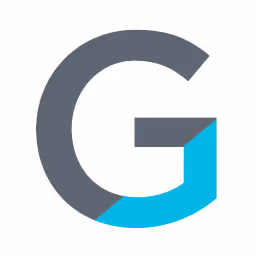Teamgate Alternatives
Find 10 Teamgate alternatives. This guide offers an in-depth comparison of features and pricing to help you choose the right CRM.

Teamgate is a solid choice for many sales teams. Users often praise its simple interface and strong pipeline management. It performs well for tracking leads and deals, which is why you might have chosen it in the first place.
However, some users note limitations. The reporting tools can be basic, and it may not integrate with all your other software. We've analyzed the best alternatives to help you find a better fit for your needs. Let's get started.
A Special Mention: 11x Digital Workers
If your sales process involves repetitive tasks, consider using digital workers. These are software agents that handle specific sales functions like lead prospecting or data entry. This frees up your team to focus on closing deals.
11x provides these digital workers. If this approach fits your strategy, explore their solutions to see how they can supplement your sales operations. Note that this is not a CRM replacement.
11x is a GTM platform that uses AI agents to manage the sales process. Its agent Alice finds prospects, handles outreach on email and LinkedIn, and updates the CRM. A second agent, Julian, qualifies inbound leads and books meetings. This replaces separate tools for data enrichment, outreach, and email warmup.
Teamgate Alternatives
Here is a detailed breakdown of the top alternatives to Teamgate. We analyze each option's pricing, main features, advantages, and potential drawbacks compared to Teamgate.
1) HubSpot CRM
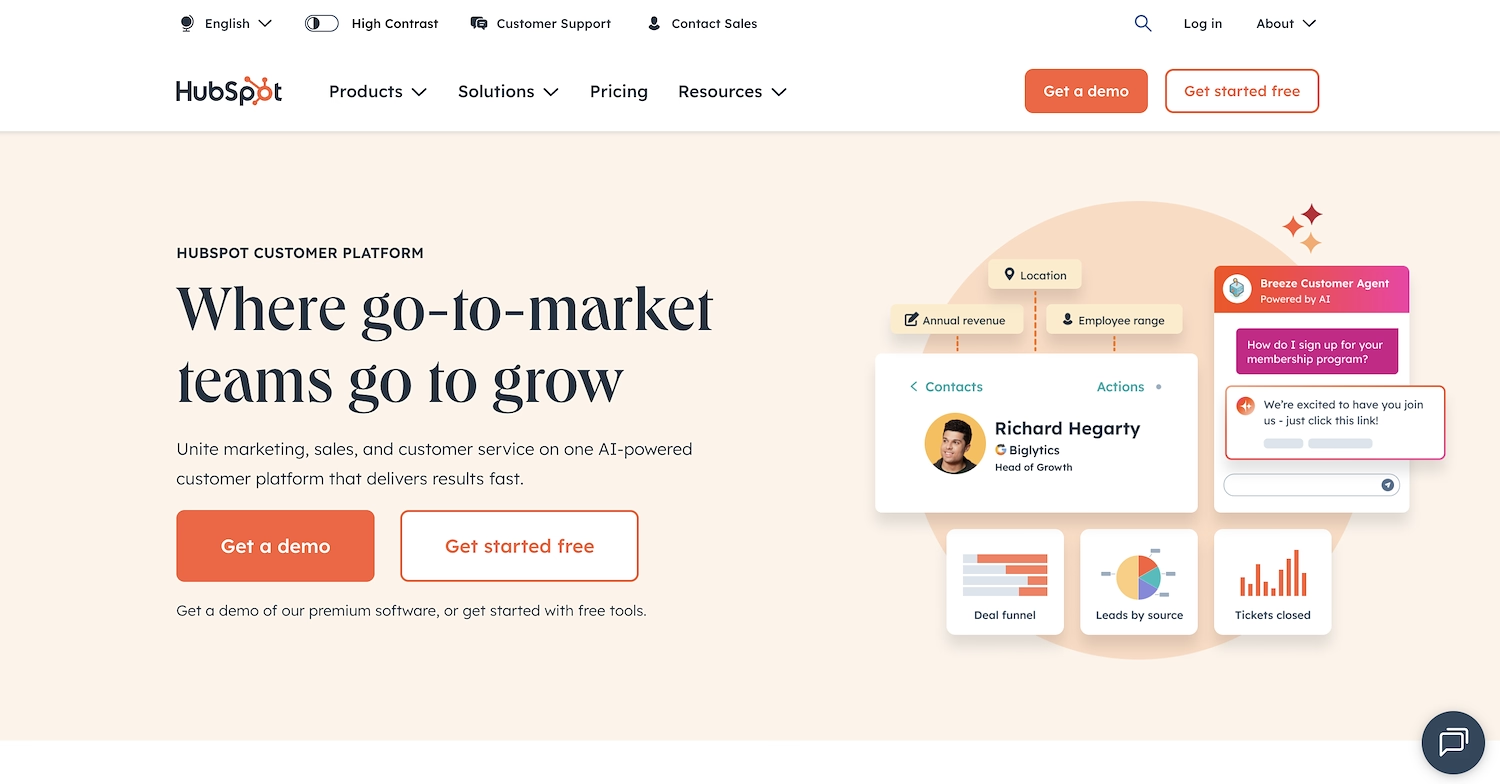
HubSpot CRM offers tools for marketing, sales, and service teams. It centralizes customer data for a single view of all interactions. Users manage contacts, track deals through the sales pipeline, and automate repetitive tasks.
The platform includes tools for reports and analytics to measure performance. It supports the customer lifecycle, from first contact to post-sale support, all within one system.
HubSpot CRM's Main Features
- Centralizes customer data for a single view of all interactions across marketing, sales, and service.
- Automates repetitive tasks for sales and marketing teams.
- Includes reporting and analytics tools to measure performance.
- Manages the entire customer lifecycle from the first contact to post-sale support within one system.
How HubSpot CRM Compares to Teamgate
Average Review score: 4.4/5 stars based on 12,407 G2 reviews.
- HubSpot CRM provides a unified platform for marketing, sales, and service, unlike Teamgate, which focuses mainly on sales pipeline management.
- It includes built-in marketing automation and campaign management tools, which are more extensive than the marketing functions available in Teamgate.
- The platform offers customer support and case management features, allowing teams to manage the full customer lifecycle from a single place.
- HubSpot provides a functional free CRM plan, which offers a different starting point compared to Teamgate's trial-based access for new users.
Potential Drawbacks of HubSpot CRM
- HubSpot CRM's pricing can increase significantly as teams grow, since many advanced features are only in professional or enterprise plans. Teamgate, in comparison, sometimes offers a more predictable cost structure for its core sales features.
- Some users find that the tool offers limited customization options for sales processes compared to Teamgate. This might be a constraint for teams with very specific workflow requirements that differ from the standard setup.
- Its all-in-one platform includes marketing and service tools, which can feel complex for teams that only need a dedicated sales CRM. Teamgate provides a more focused and sometimes simpler user experience centered purely on sales pipeline management.
Pricing and Cost-Effectiveness
HubSpot offers a free CRM, with paid Sales Hub plans at $20 (Starter), $100 (Professional), and $150 (Enterprise) per seat monthly. While the free plan is a good entry point, costs escalate quickly for the professional and enterprise tiers, which contain the more advanced features.
2) Pipedrive
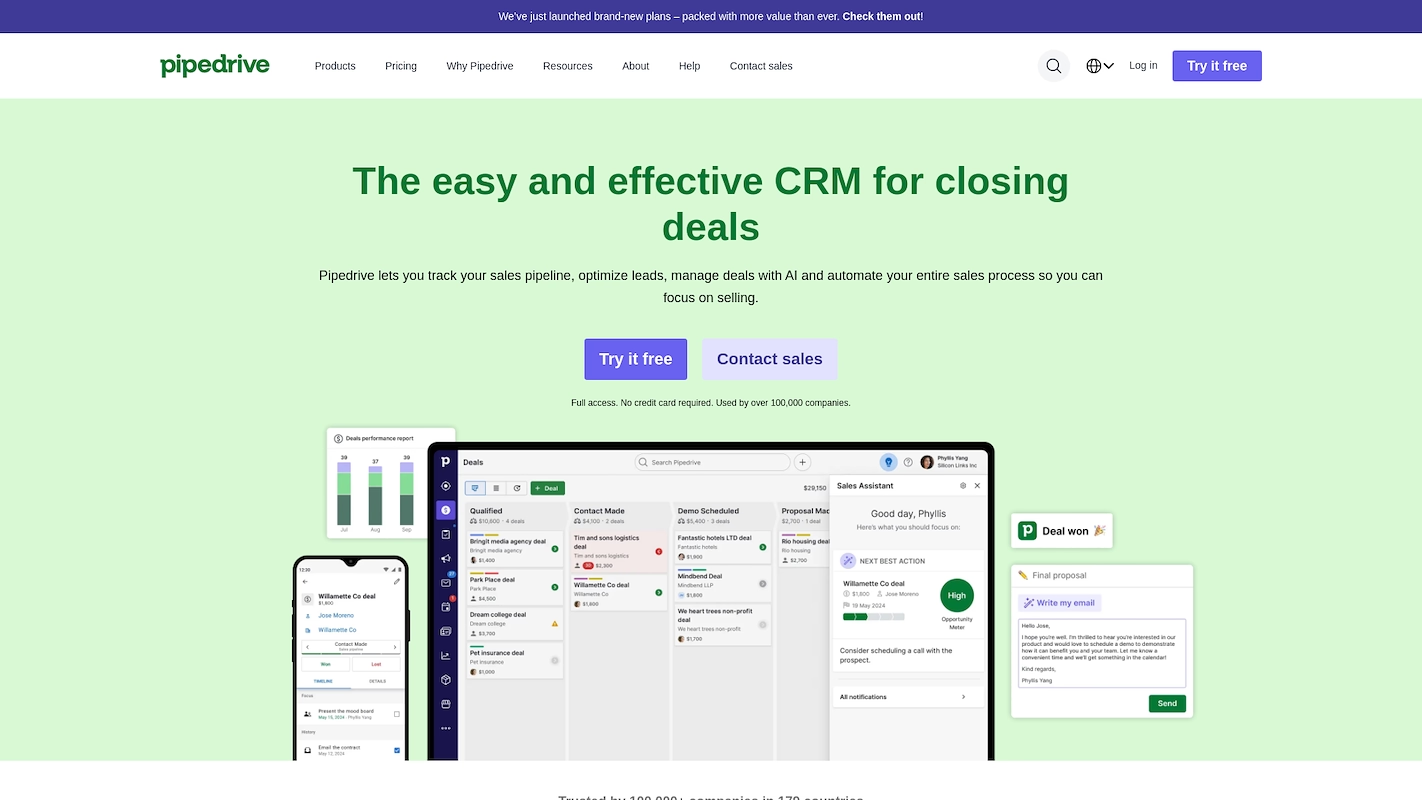
Pipedrive is a web-based CRM for sales-driven teams. It helps track pipelines, manage deals, and automate work through a visual, kanban-style interface. The platform offers AI-powered guidance and centralizes customer data and communications in one workspace.
Users can automate lead follow-ups, create sales forecasts, and sync email and calendars. Pipedrive also allows for custom pipelines to match specific buyer journeys.
Pipedrive's Main Features
- Offers a visual, kanban-style pipeline with drag-and-drop functionality, custom stages, and custom data fields.
- Provides an AI Sales Assistant that delivers deal-win predictions and daily insights, alongside workflow automation templates.
- Includes two-way email sync with tracking, integrated calendar sync, and automated multi-step email sequences for lead nurturing.
- Features real-time dashboards, custom reports, and revenue forecasting for both recurring and one-off deals.
How Pipedrive Compares to Teamgate
Average Review score: 4.3/5 stars based on 2,573 G2 reviews.
- Pipedrive provides a visual, drag-and-drop sales pipeline. This offers a more interactive user experience for managing deals compared to Teamgate's pipeline management.
- It includes an AI Sales Assistant that gives deal-win predictions. This provides data-driven guidance that is not a standard feature in Teamgate.
- The platform offers more extensive automation with features like automated multi-step email sequences for lead nurturing, which goes beyond Teamgate's basic task automation.
- Pipedrive has more advanced reporting tools, including revenue forecasting for both recurring and one-off deals. This is a step up from Teamgate's more basic analytics.
Potential Drawbacks of Pipedrive
- Pipedrive's lower-priced plans do not include some features like email sync. This means teams might need to upgrade to a higher tier for full functionality, which can differ from Teamgate's pricing structure.
- Some users find the tool's distinction between company and individual contacts can be cumbersome. This might add a step to contact management compared to the more unified approach some find in Teamgate.
- While it is often considered user-friendly, some teams experience a learning curve during setup. For businesses that need immediate adoption, Teamgate's simpler interface may present fewer initial challenges.
Pricing and Cost-Effectiveness
Pipedrive's plans cost $24 (Lite), $49 (Growth), $79 (Premium), and $99 (Ultimate) per seat monthly. While Pipedrive's costs scale with features, Teamgate may offer a more predictable price for its core sales tools. For the most up-to-date pricing, visit Pipedrive's official website.
3) Zoho CRM
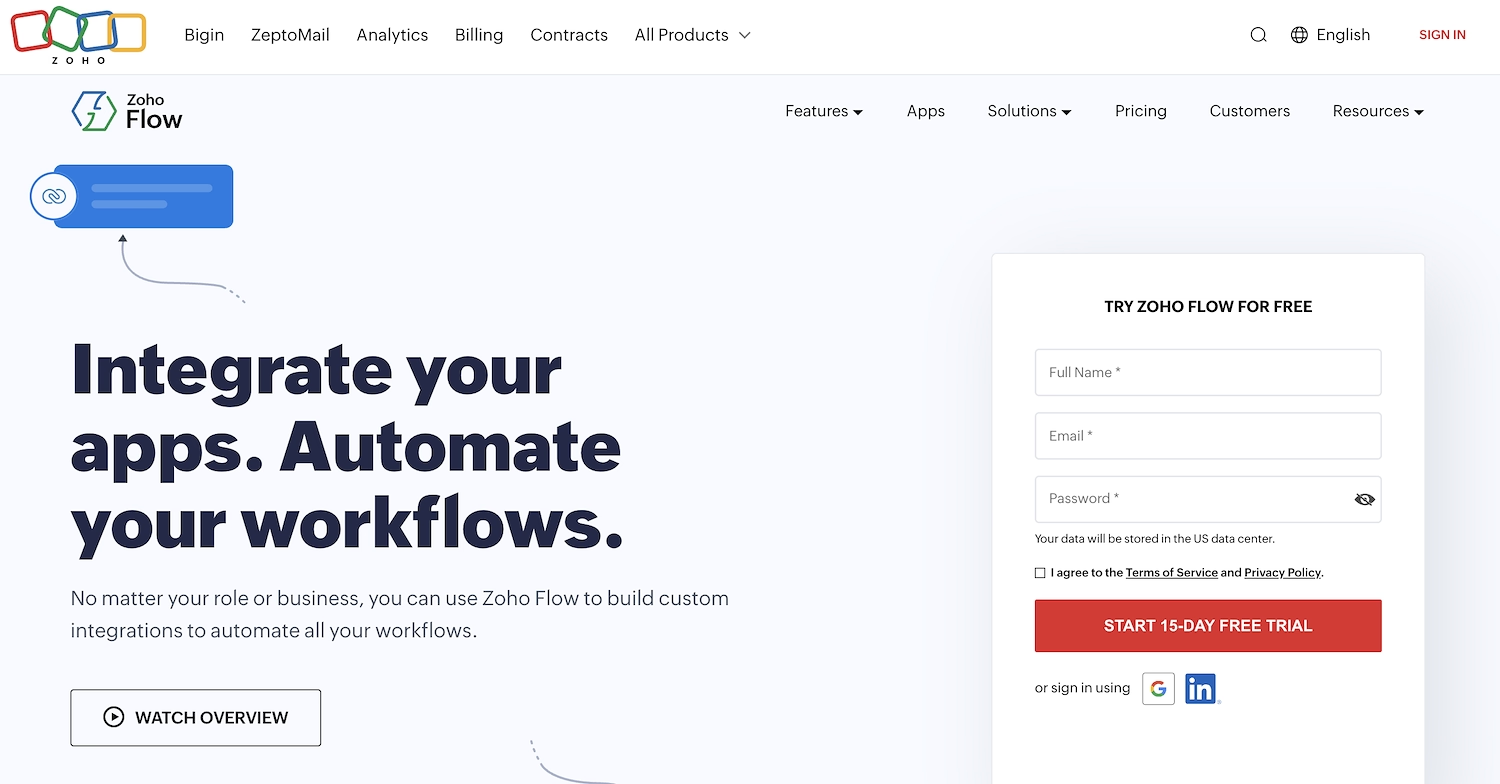
Zoho CRM is a cloud-based platform that helps organizations convert more leads and build customer relationships. It emphasizes cross-functional collaboration and a 360-degree view of every customer. The system uses AI for tasks like email composition and anomaly detection.
It also automates processes with workflows to accelerate deal cycles. Businesses can create separate workspaces for departments like marketing and finance, which then share core sales data.
Zoho CRM's Main Features
- Uses AI for tasks like email composition, anomaly detection, and providing predictive insights.
- Offers dedicated collaborative work areas called Teamspaces, so each department sees only the data it needs.
- Includes advanced sales automation with workflows, cadences, and a configure-price-quote (CPQ) function.
- Provides a Canvas Design Studio for drag-and-drop UI customization and image-to-layout generation.
How Zoho CRM Compares to Teamgate
Average Review score: 4.1/5 stars based on 2,820 G2 reviews.
- Zoho CRM includes an AI assistant for predictive insights, which offers more advanced guidance than Teamgate's standard analytics.
- It provides a drag-and-drop design studio to customize the user interface, allowing for more visual personalization compared to Teamgate's more fixed layout.
- The platform offers separate workspaces for different departments like marketing and finance. This supports broader company collaboration, while Teamgate focuses primarily on the sales team's workflow.
- Its sales automation includes a configure-price-quote (CPQ) function, which provides more specialized sales process support than Teamgate's general task automation.
Potential Drawbacks of Zoho CRM
- Zoho CRM's extensive feature set can introduce a steep learning curve. Some teams may find the initial setup and onboarding more complex compared to Teamgate's straightforward, sales-focused approach.
- The platform's all-in-one design includes tools for marketing and service. This might feel overwhelming for teams that only need a dedicated sales CRM, unlike Teamgate, which centers purely on the sales pipeline.
- Some users report that the interface can feel cluttered due to its many options. This is different from Teamgate's user experience, which is often described as simpler and more intuitive for daily sales tasks.
Pricing and Cost-Effectiveness
Zoho CRM has a free plan, plus paid tiers at $14 (Standard), $23 (Professional), and $40 (Enterprise) per user monthly. Unlike Teamgate's trial-based access, Zoho offers a free entry point. For current pricing, visit Zoho CRM's official website.
4) Salesforce Sales Cloud
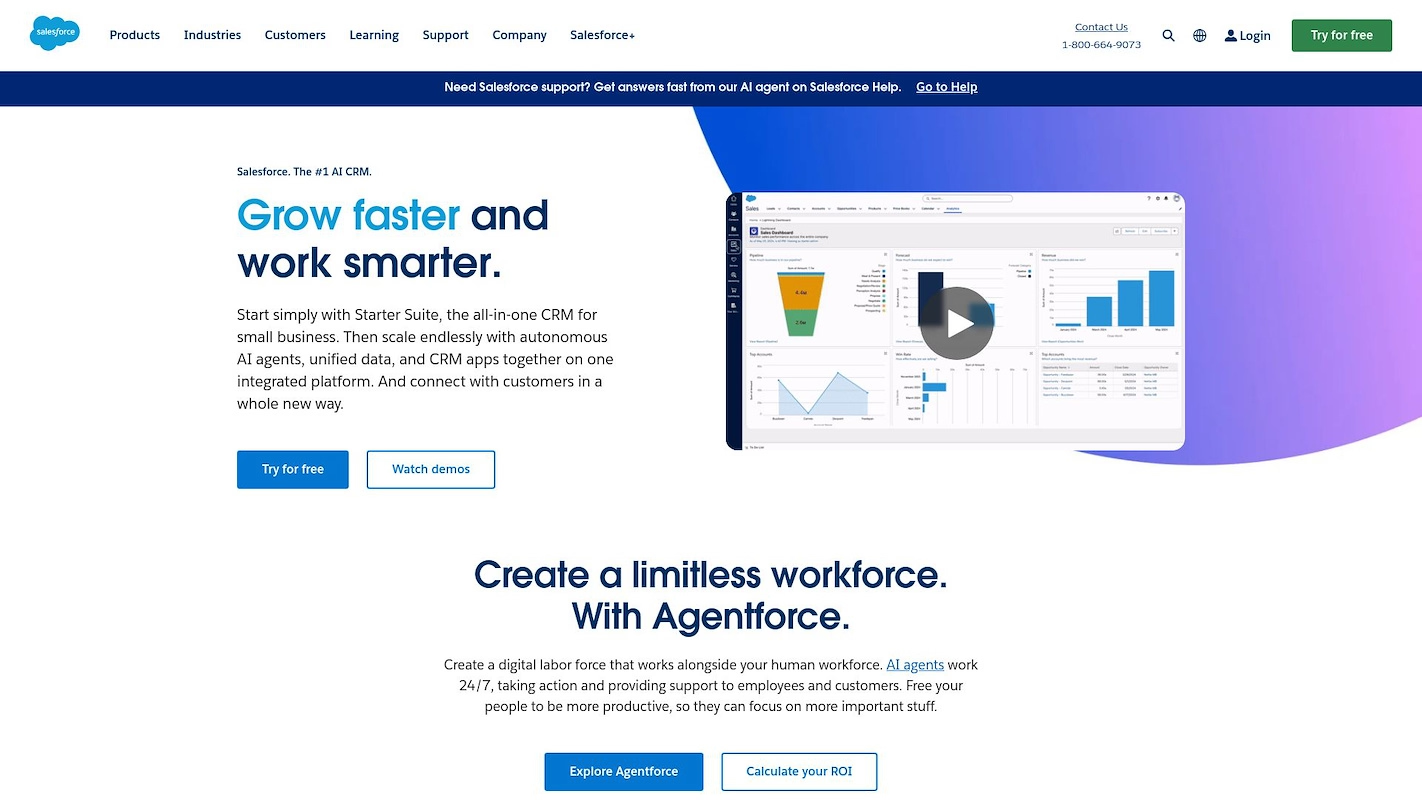
Salesforce Sales Cloud is a sales platform that centralizes customer information. It combines data from marketing, sales, and customer service with business analytics. The platform connects to thousands of applications via the AppExchange.
Businesses of all sizes use it to manage pipelines, monitor customer interactions, and automate sales tasks. It also provides tools for sales forecasts and territory management.
Salesforce Sales Cloud's Main Features
- Deploys AI-driven sales agents to autonomously nurture leads, handle objections, and book meetings.
- Manages the entire revenue lifecycle with integrated tools for configure-price-quote (CPQ), contracts, and billing.
- Includes native Partner Relationship Management (PRM) tools to drive channel sales and manage resellers and distributors.
- Delivers outcome-based enablement and training for sales teams directly within their workflow.
How Salesforce Sales Cloud Compares To Teamgate
Average Review score: 4.4/5 stars based on 23,364 G2 reviews.
- Salesforce Sales Cloud uses AI-driven agents to autonomously nurture leads and book meetings, offering more advanced automation than Teamgate's standard task management.
- The platform provides native Partner Relationship Management (PRM) tools to manage channel sales, a specialized function not found in Teamgate's core sales focus.
- It includes integrated tools for the entire revenue lifecycle, such as configure-price-quote (CPQ) and billing, while Teamgate centers more on pipeline and deal tracking.
- The tool offers more extensive integration options through its AppExchange, which connects to thousands of applications, addressing a potential limitation in Teamgate.
Potential Drawbacks of Salesforce Sales Cloud
- Salesforce Sales Cloud's pricing can become expensive as teams add more users or need advanced features. Teamgate, in comparison, sometimes offers a more predictable cost structure for its core sales tools.
- The platform's extensive customization options and features can create a steep learning curve. Some teams may find Teamgate's simpler, more focused interface easier to adopt quickly.
- It is an all-in-one platform, which might feel complex for teams that only need a dedicated sales CRM. Teamgate provides a more streamlined experience centered purely on sales pipeline management.
Pricing and Cost-Effectiveness
Salesforce Sales Cloud plans start at $25 per user monthly, with Professional and Enterprise tiers at $100 and $165, respectively. This tiered model can be more expensive for advanced features compared to Teamgate's more predictable pricing. For detailed pricing, visit Salesforce Sales Cloud's official website.
5) Freshsales
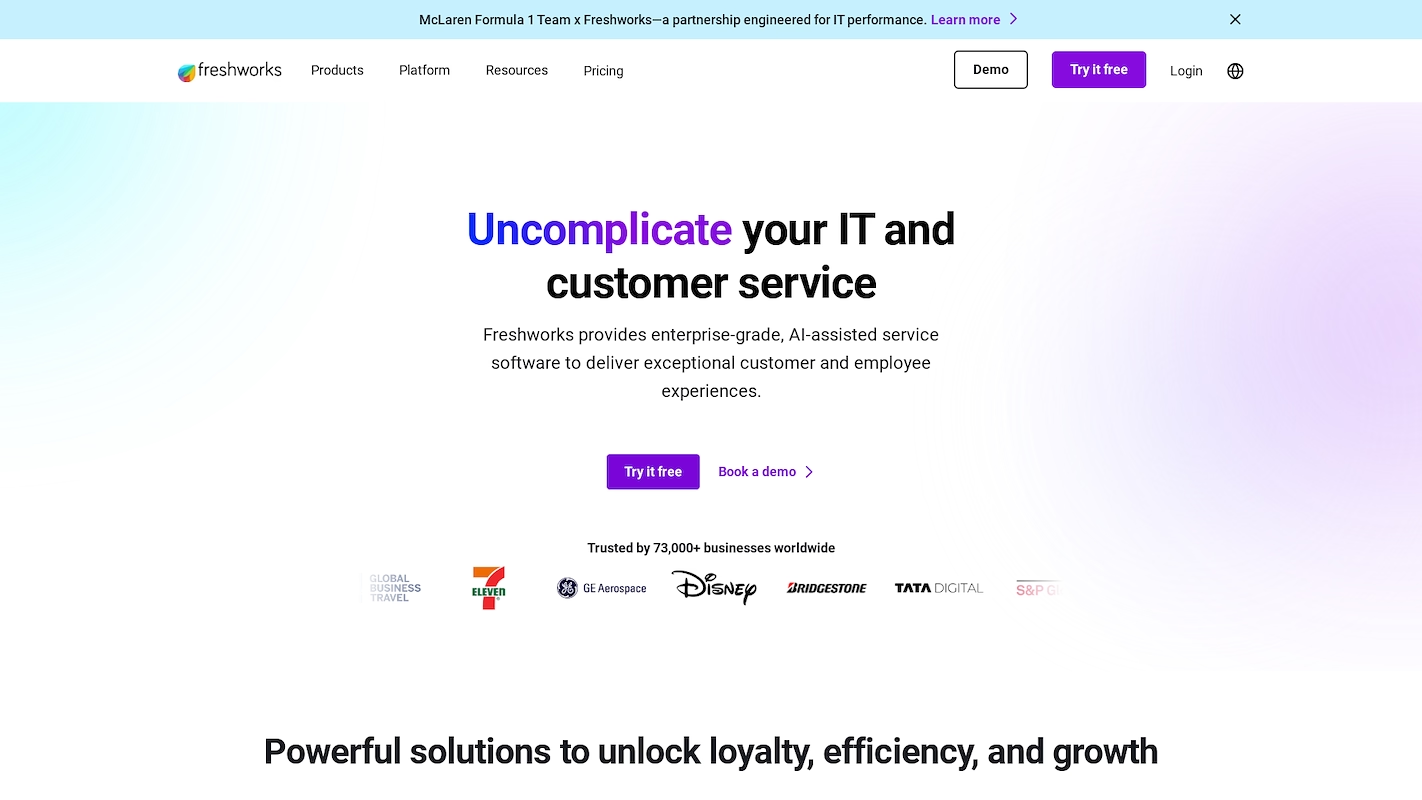
Freshsales is a CRM platform for sales and marketing teams. It unifies customer data to provide a complete view of each contact. The system captures the customer lifecycle, from the first touchpoint to later interactions, and uses AI to offer insights.
It also automates sales and marketing processes. Teams can manage pipelines, run campaigns, and personalize customer contact across channels.
Freshsales's Main Features
- Uses Freddy AI to run intelligent campaigns, qualify leads, and track them.
- Provides deal recommendations and highlights pipeline bottlenecks with Freddy AI.
- Includes an AI writing assistant that drafts emails and provides always-on guidance.
- Engages prospects on their preferred channels with full context and intent scoring.
How Freshsales Compares To Teamgate
Average Review score: 4.5/5 stars based on 1,224 G2 reviews.
- Freshsales uses its AI to provide deal recommendations and identify pipeline bottlenecks. This offers more data-driven guidance compared to Teamgate's standard reporting features.
- It unifies sales and marketing automation tools on one platform, which is different from Teamgate's primary focus on sales pipeline management.
- The platform includes customer support and case management features. This allows teams to manage post-sale activities, an area not covered by Teamgate's core sales tools.
- Freshsales offers built-in phone and chat functions for direct customer engagement. This contrasts with Teamgate, which may require separate tools for communication.
Potential Drawbacks Of Freshsales
- The platform's all-in-one design can create a steeper learning curve for some teams. In comparison, Teamgate's focused sales interface is often considered more intuitive and faster to adopt.
- Some users report that the interface feels cluttered because of its many sales and marketing tools. Teamgate provides a more streamlined experience that centers purely on sales pipeline management.
- Its broad feature set means some core functions might feel less specialized. For example, teams that require very robust pipeline management may prefer Teamgate's dedicated and more direct approach.
Pricing and Cost-Effectiveness
Freshsales offers plans at $9 (Growth), $39 (Pro), and $59 (Enterprise) per user monthly. This tiered model provides a low entry point, which may contrast with Teamgate's more predictable cost structure. For the most current pricing, it is best to visit the official Freshsales website.
Consider 11x for Sales Automation
While the CRMs listed above help manage your sales process, some teams need to automate specific, repetitive tasks. Digital workers can handle functions like lead prospecting and data entry, freeing up your sales staff to focus on high-value activities.
If this type of automation aligns with your strategy, consider exploring 11x. Their digital agents are designed to manage outreach and qualify leads, which can supplement your main CRM system. This is a different approach to improving sales efficiency.
With 11x, we use AI to run your sales playbook. Alice finds accounts, enriches their data, and handles outreach. Julian takes calls, qualifies prospects, and schedules meetings. Our platform replaces tools for intent signals and email warmup, so no extra software is required.
Book a demo to see it in action.
6) Insightly
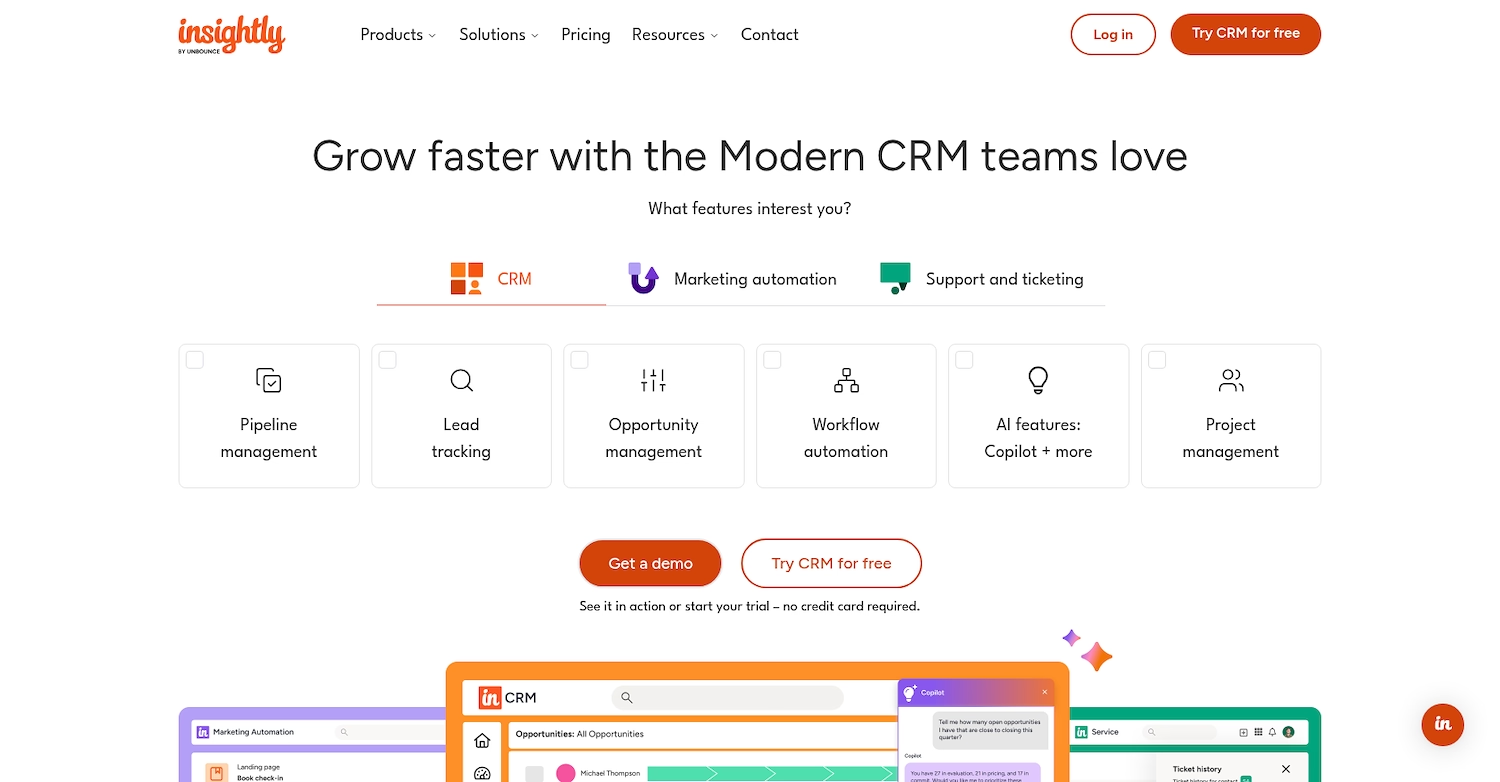
Insightly is a unified CRM platform that aligns sales, marketing, and project teams around a single view of the customer. Businesses use it to build relationships, accelerate sales, and deliver projects on schedule. It provides a complete view of the customer journey.
The system helps manage leads, track sales opportunities, and run marketing campaigns. It is popular with B2B companies in industries such as technology, consulting, and manufacturing.
Insightly's Main Features
- Centralizes customer data and manages pipelines with custom objects, fields, and project stages.
- Designs multi-step customer journeys, email campaigns, and landing pages with a drag-and-drop builder.
- Provides customer self-service portals, knowledge bases, and SLA-driven ticket management.
- Connects to other applications like Slack and QuickBooks through its AppConnect no-code integration hub.
How Insightly Compares To Teamgate
Average Review score: 4.2/5 stars based on 922 G2 reviews.
- Insightly includes project management tools, which allows teams to manage post-sale activities in the same system. This differs from Teamgate's focus on the sales pipeline.
- It provides built-in features for creating quotes and managing price books. Teamgate, in comparison, centers more on core deal and pipeline tracking.
- The platform offers a no-code integration hub to connect with over 500 applications. This provides more integration options than Teamgate.
- Insightly has a customer service portal and knowledge base. This creates a unified platform for sales and support, unlike Teamgate's sales-specific design.
Potential Drawbacks Of Insightly
- The platform's all-in-one design includes marketing and project tools. This might feel complex for teams that only need a dedicated sales CRM, whereas Teamgate offers a more focused experience.
- Some users report a steep learning curve with Insightly's advanced features. This can be a challenge for teams that need quick adoption, an area where Teamgate's simpler interface is often praised.
- Its mass email function has a limit of 50 contacts at once. This restriction might hinder larger outreach campaigns, a task that can be less constrained in a more specialized sales tool like Teamgate.
Pricing and Cost-Effectiveness
Insightly offers plans at $29 (Plus), $49 (Professional), and $99 (Enterprise) per user monthly. This tiered model means costs scale with features, which may differ from Teamgate's more predictable pricing for its core sales tools.
7) Copper CRM
Copper is a CRM designed for Google Workspace users. It integrates directly into Gmail, allowing teams to manage leads and customer relationships from their inbox. The system automatically captures contact details and communication history, reducing manual data entry.
Copper's Main Features
- Integrates directly with Google Workspace, including Gmail and Google Calendar, to manage contacts and deals from the inbox.
- Automates data entry by capturing contact information, emails, and files from Gmail conversations.
- Provides visual pipeline management with drag-and-drop functionality to track deal progress.
- Includes workflow automation to create tasks and send email reminders based on specific triggers.
How Copper CRM Compares To Teamgate
Average Review score: 4.5/5 stars based on 1,278 G2 reviews.
- Copper's primary advantage is its native integration with Google Workspace, which embeds the CRM directly into Gmail. Teamgate operates as a separate, standalone application.
- It automates contact and data entry from the inbox, a different approach from Teamgate's more manual data management processes.
- The user experience is centered around the inbox, which can suit teams that live in Gmail. Teamgate provides a more traditional, dedicated CRM interface.
- Copper offers lead and contact enrichment features, which provide additional data automatically. This is a function that may require third-party tools with Teamgate.
Potential Drawbacks Of Copper CRM
- Copper's deep reliance on Google Workspace makes it unsuitable for businesses that use other ecosystems, such as Microsoft 365. Teamgate is platform-agnostic.
- Some users find its reporting capabilities are less extensive than those in more sales-focused platforms like Teamgate, which may offer deeper analytics.
- The platform's feature set, while strong on integration, might be less comprehensive for complex sales processes compared to Teamgate's dedicated sales tools.
Pricing and Cost-Effectiveness
Copper's plans are $29 (Basic), $69 (Professional), and $134 (Business) per user monthly. The cost is higher than some Teamgate plans, but its value is tied to the Google Workspace integration, which can improve efficiency for teams using that ecosystem.
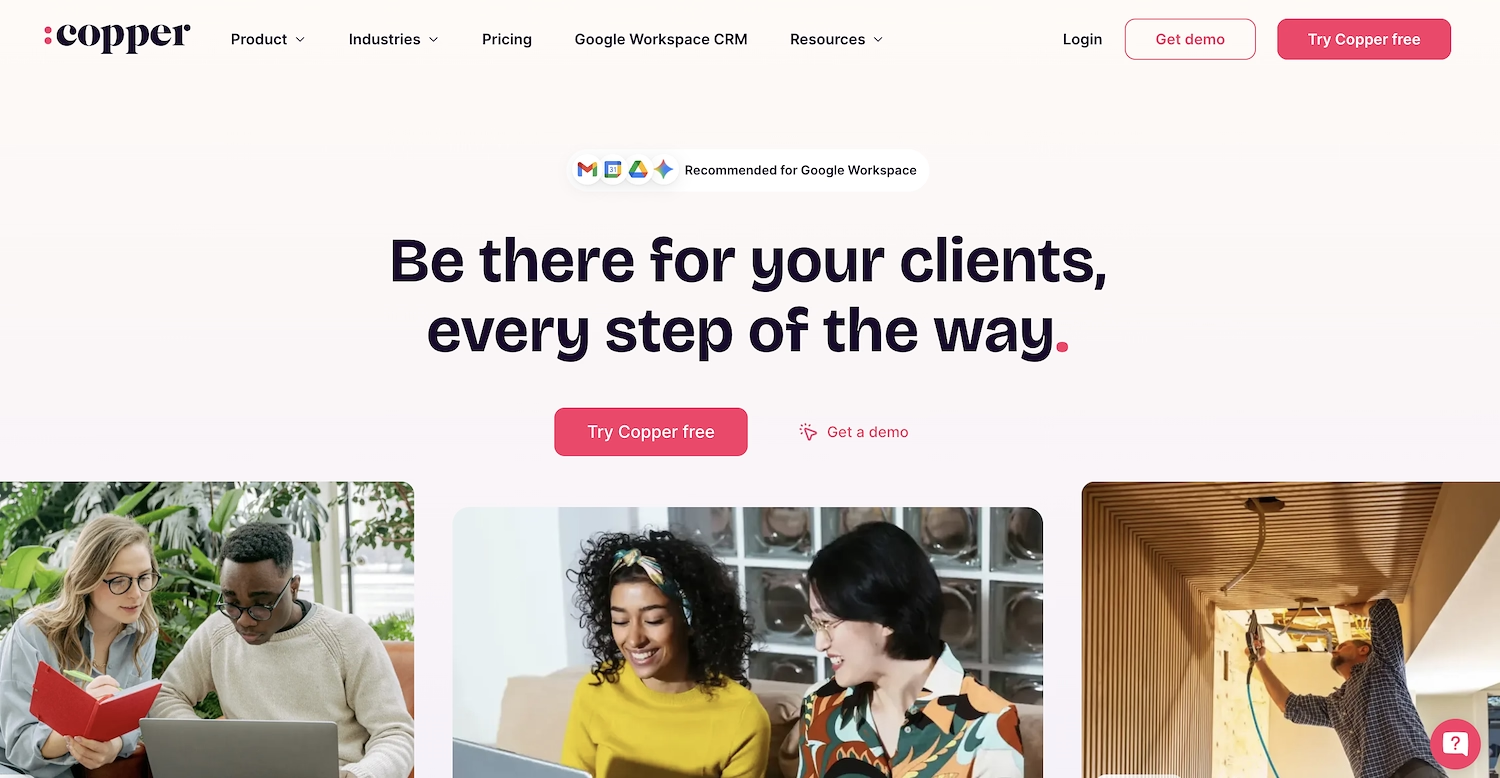
Copper CRM is a tool for Google Workspace users that works inside Gmail. Teams manage leads and customer relationships from their inbox. The system automatically captures contact details and communication history, which reduces manual data entry.
Copper CRM's Main Features
- Duplicates closed deals into projects to manage tasks, track delivery, and facilitate team collaboration.
- Builds personalized and automated email series and includes a function to re-engage dormant contacts.
- Captures leads from website forms, business-card scanning, and a LinkedIn web clipper.
- Offers a real-time activity feed that shows all customer interactions like emails, tasks, and comments.
How Copper CRM Compares To Teamgate
Average Review score: 4.5/5 stars based on 1,139 G2 reviews.
- Copper integrates directly with Google Workspace, so it works inside Gmail. This is different from Teamgate, which is a separate application and requires switching between tabs.
- It automatically adds contact details and emails from your inbox. This reduces manual data entry, which is a more common task when using Teamgate.
- The platform converts closed deals into projects with one click. This allows teams to manage delivery after the sale, a function separate from Teamgate's core sales pipeline.
- Copper captures leads from website forms and a LinkedIn web clipper. This offers more automated ways to add prospects compared to Teamgate's lead management process.
Potential Drawbacks Of Copper CRM
- Copper offers fewer options to customize sales pipelines compared to Teamgate. Teams with unique sales cycles might find it difficult to adapt the tool, as Teamgate often allows for more detailed stage and field customization.
- The platform's focus is on contact management within the Google ecosystem. This means it may lack some specialized sales management features, like advanced territory management, that a dedicated sales CRM like Teamgate might offer.
- Some users report that getting timely and effective customer support can be a challenge. This is different from platforms that specialize only in sales CRM, where support is often more focused on specific sales-related issues.
Pricing and Cost-Effectiveness
Copper's plans are priced at $23 (Basic), $59 (Professional), and $99 (Business) per user monthly when billed annually. This cost scales with features tied to its Google integration, whereas Teamgate may offer a more predictable price for its core sales toolset.
8) monday sales CRM
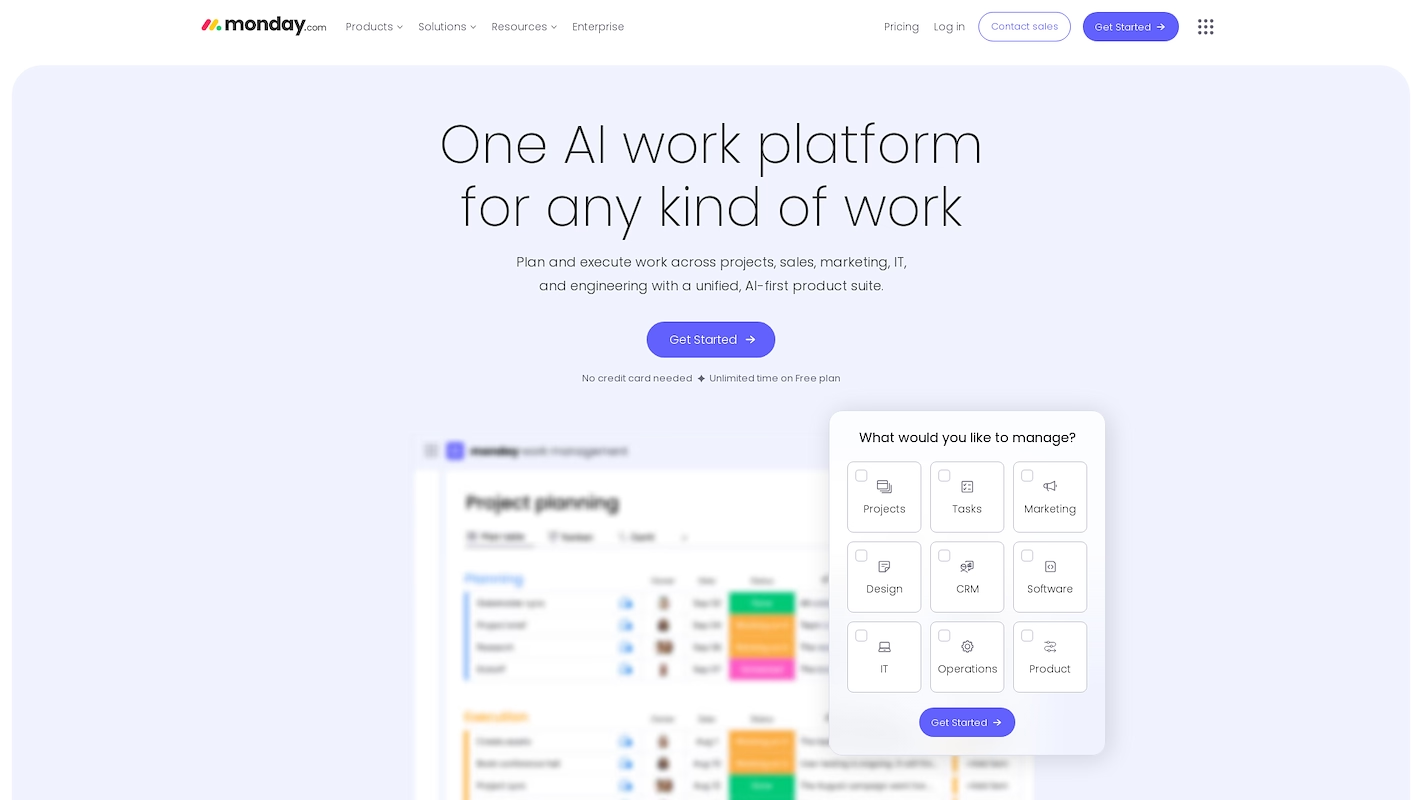
monday sales CRM operates on the monday.com Work OS. It allows teams to manage the full sales cycle, from lead capture to post-sale projects. The platform centralizes all customer data and automates repetitive tasks.
Users can build custom pipelines and dashboards to match their sales process. This provides a single location for sales operations and client management.
monday sales CRM's Main Features
- Centralizes customer data and manages post-sales activities, including billing, contracting, and onboarding.
- Includes AI capabilities for email generation, sentiment analysis, and sales forecasting.
- Offers no-code automations and customization to adapt the CRM to a team's specific sales process.
- Provides shared email inboxes and a mass email function with an HTML editor.
How Monday Sales CRM Compares To Teamgate
Average Review score: 4.6/5 stars based on 973 G2 reviews.
- monday sales CRM manages post-sales activities like billing and client onboarding in the same platform. This provides a more connected workflow compared to Teamgate, which focuses primarily on the pre-sale pipeline.
- It includes AI tools for email generation and sentiment analysis. This offers more advanced assistance for sales communication than the standard features found in Teamgate.
- The platform offers no-code automations and customization. This allows teams to adapt the CRM to their specific process more flexibly than Teamgate's more structured setup.
- This tool provides shared email inboxes and a mass email function with an HTML editor, giving teams more direct communication tools within the CRM, whereas Teamgate might require other applications for similar tasks.
Potential Drawbacks Of Monday Sales CRM
- monday sales CRM is built on a broad Work OS platform. Some teams might find this complex if they only need a dedicated sales tool, unlike Teamgate's more focused approach to pipeline management.
- The platform's high level of customization can sometimes lead to a steep learning curve. Some users report that setting up the system is more complex compared to Teamgate's simpler, more structured interface.
- As it is part of a larger work management platform, some specialized sales features might feel less developed. Users sometimes note that advanced sales reporting is less intuitive compared to the dedicated analytics in a pure sales CRM like Teamgate.
Pricing and Cost-Effectiveness
monday sales CRM offers plans at $12 (Basic), $17 (Standard), and $28 (Pro) per user monthly. This tiered model provides a low entry point, but costs increase with more advanced features. Teamgate, in contrast, is often described as having a more predictable cost structure for its core sales toolset.
9) Keap
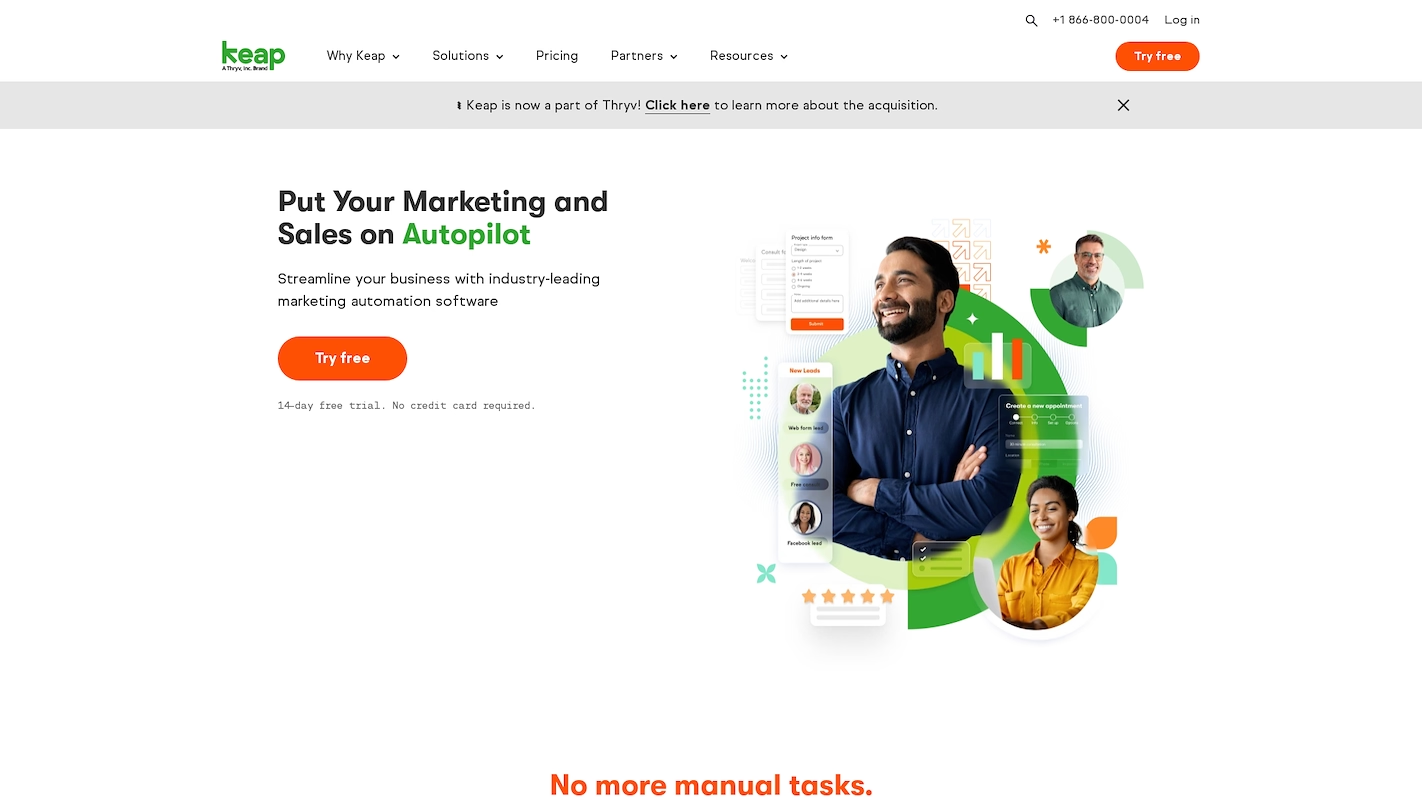
Keap provides a CRM platform with sales and marketing automation for small businesses. It helps users organize client information and communications in one place. The system automates follow-up and other repetitive tasks to save user time.
Businesses use it to capture leads, manage a sales pipeline, and handle invoices. The platform suits service-based companies and entrepreneurs who need a combined tool for sales and client management.
Keap's Main Features
- Automates marketing and email campaigns.
- Builds and personalizes emails, sends outbound campaigns, and manages deliverability.
- Creates mobile-optimized landing pages and forms with dynamic content.
- Provides basic reporting and analytics for performance measurement.
How Keap Compares To Teamgate
Average Review score: 4.2/5 stars based on 1,563 G2 reviews.
- Keap combines sales and marketing automation tools in one platform. Teamgate, in contrast, concentrates on sales pipeline management. This combination in Keap lets users manage lead campaigns and sales follow-ups from a single interface.
- It includes a tool to create mobile-optimized landing pages and forms. This provides a built-in method for lead capture, a function not standard in Teamgate's core sales toolset.
- The platform supports invoice management and can process payments directly within the CRM. This extends its use beyond Teamgate's focus on pre-sale deal and pipeline tracks.
- This tool offers native SMS marketing for direct communication with leads. In comparison, Teamgate typically needs third-party apps for similar text message outreach.
Potential Drawbacks Of Keap
- Keap provides basic reporting tools. Some users find these less comprehensive for in-depth sales analysis compared to the more specialized analytics available in a dedicated sales CRM like Teamgate.
- The platform combines many tools for sales, marketing, and billing. For teams with complex sales cycles, its sales-specific features might feel less developed than the dedicated pipeline management tools found in Teamgate.
- Some users report a steep learning curve due to its extensive features. This can make initial setup more complex compared to Teamgate, which is often noted for its more straightforward and intuitive sales-focused interface.
Pricing and Cost-Effectiveness
Keap's pricing starts at $249 per month for 1,500 contacts, a model based on contact volume. This differs from Teamgate's per-user pricing structure, which may be more cost-effective for businesses with large contact databases but smaller sales teams.
10) Close
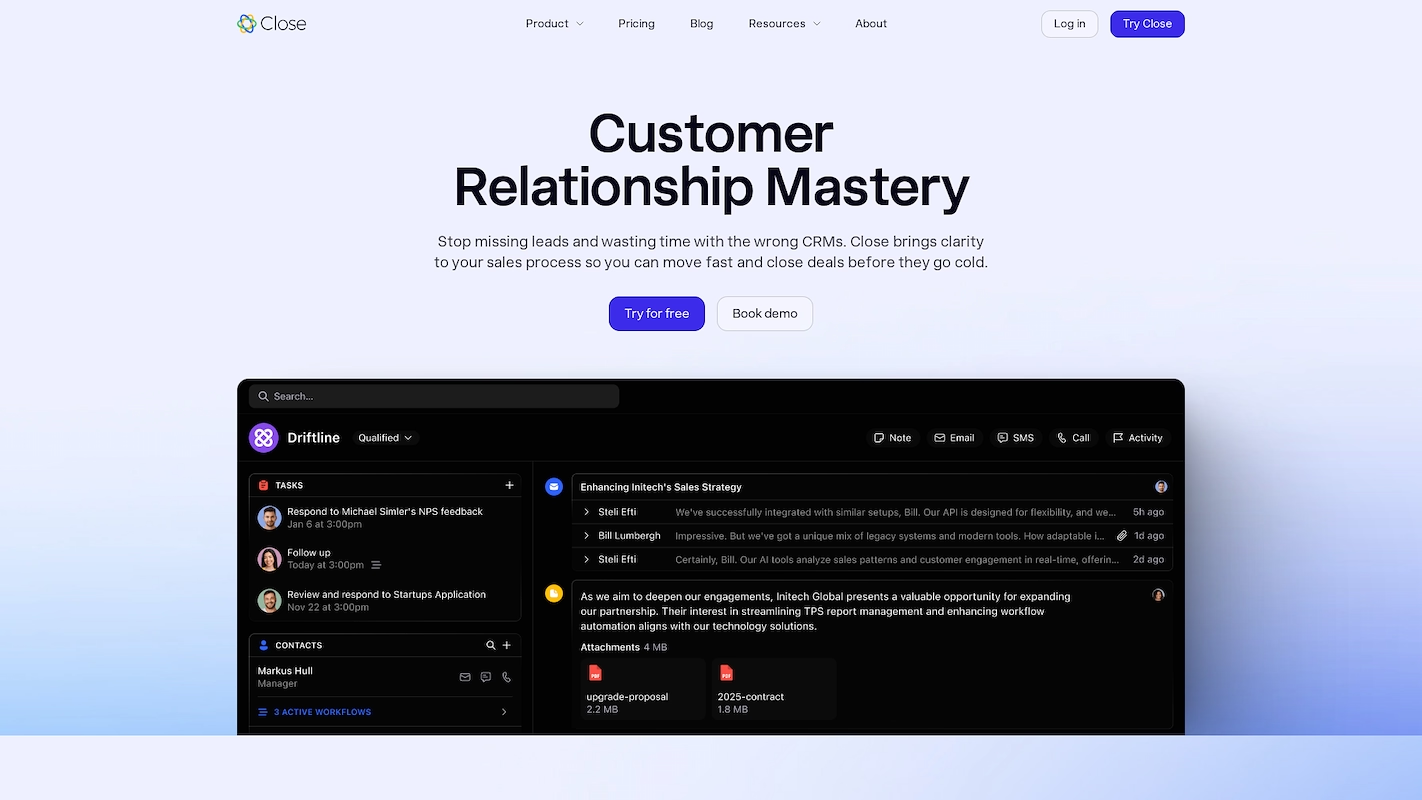
Close is a CRM platform for sales teams at startups and small to mid-sized businesses. It combines tools for calls, email, and automation in one system, so no add-ons are required. Sales leaders use the platform to coach their reps.
Sales teams manage the full process, from the prospect stage to the final close, with a focus on sales activities over data entry.
Close's Main Features
- Combines communication tools, including a built-in business phone, SMS marketing, and an auto dialer.
- Includes marketing automation features for managing email campaigns.
- Provides customer support functions such as case management and a knowledge base.
- Uses an AI sales assistant to provide suggestions and improve productivity.
How Close Compares To Teamgate
Average Review score: 4.7/5 stars based on 1,812 G2 reviews.
- Close combines communication tools, including a built-in business phone and SMS marketing. This is different from Teamgate, which often requires separate applications for direct outreach.
- It includes a built-in auto dialer to help sales teams make more calls. This provides a function for high-volume outreach not found in Teamgate's standard toolset.
- The platform uses an AI sales assistant to provide suggestions and improve productivity. This offers more advanced guidance compared to Teamgate's standard reporting features.
- This tool provides customer support functions such as case management. This allows teams to handle post-sale issues, an area not covered by Teamgate's core sales tools.
Potential Drawbacks Of Close
- Close offers fewer customization options for sales pipelines compared to Teamgate. Some teams with unique sales processes might find it less flexible, as Teamgate often allows for more detailed adjustments to stages and fields.
- Some users report a learning curve with Close, especially for role assignments. This is different from Teamgate, which is often noted for its simpler interface that can allow for quicker team adoption.
- The tool's all-in-one design includes many communication features. For teams that only need a dedicated sales pipeline tool, this might feel less specialized compared to Teamgate's more focused approach to deal and pipeline management.
Pricing and Cost-Effectiveness
Close offers plans at $9 (Solo), $35 (Essentials), $99 (Growth), and $139 (Scale) per user monthly. While its per-user model is similar to Teamgate's, Close provides a lower entry point for single users, whereas Teamgate may offer a more predictable cost structure for its core sales features.
Which One Should You Go With?
The right Teamgate alternative depends on your specific business needs, team size, and budget. This guide analyzed several options to provide a clear basis for your decision.
If your goal is sales function automation for tasks like prospect discovery and outreach, 11x offers a different approach. Its digital workers supplement your CRM to handle repetitive work, so your team can focus on deal closures.



